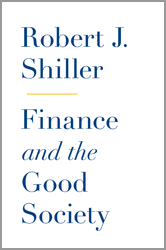Robert J. Shiller is Professor of Economics at Yale University and the co-creator of the Case-Shiller Index of US house prices. His book Irrational Exuberance presciently warned of the dot-com bubble, and a second edition, released in 2005, predicted the coming collapse of the real-estate bubble. His most recent book, co-written with George Akerlof, is Animal Spirits: How Human Psychology Drives the Economy and Why It Matters for Global Capitalism.
I would love to read his new book Finance and the Good Society with our book club.
Shiller is suggested as a possible Nobel Prize winner “for pioneering contributions to financial market volatility and the dynamics of asset prices”
But it is not for these accurate market forecasts or for his index that he may be in the running for Nobel honors. Rather, it is for his many studies of volatility in asset prices. In particularly, his 1981 article in American Economic Review, “Do Stock Prices Move Too Much to be Justified by Subsequent Changes in Dividends,” is a classic and highly cited study that challenged the widely accepted Efficient Market Hypothesis. This paper has been cited more than 700 times, is Shiller’s most cited journal article, and is listed in a summary on what mattered most in economics since 1970 and as one of the 20 most influential articles ever published in the American Economic Review, a study authored by several past Nobel Prize (see: http://economics.mit.edu/files/6349).

No comments:
Post a Comment